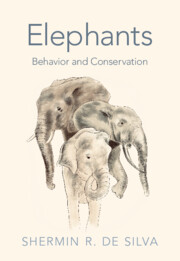8 - Conflict and Coexistence
Ecological, Political, or Psychological?
Published online by Cambridge University Press: 12 December 2024
Summary
This chapter examines how practices originating in the colonial era have altered human land-use practices and mindsets across both Asia and Africa. It offers a stringent critique of understanding habitat suitability purely in terms of undisturbed “equilibrium” ecological conditions, absent of humans. Instead, it lays out the longer view, in which elephant distributions have been concurrent with anthropogenic ecological regimes culturally maintained over millennial timescales. It underscores the need for recognizing and reconciling historic land-use traditions such as shifting agriculture and Indigenous fire practices with present-day governance policies. It concludes by making a case for why present-day conditions may not adequately capture the past or future of elephant ecosystems, why protected areas alone will not suffice to serve these species in the face of global change, and how elephants’ remarkable adaptability and behavioral flexibility can act as both asset and liability, depending on human responses.
Keywords
- Type
- Chapter
- Information
- ElephantsBehavior and Conservation, pp. 211 - 237Publisher: Cambridge University PressPrint publication year: 2024

